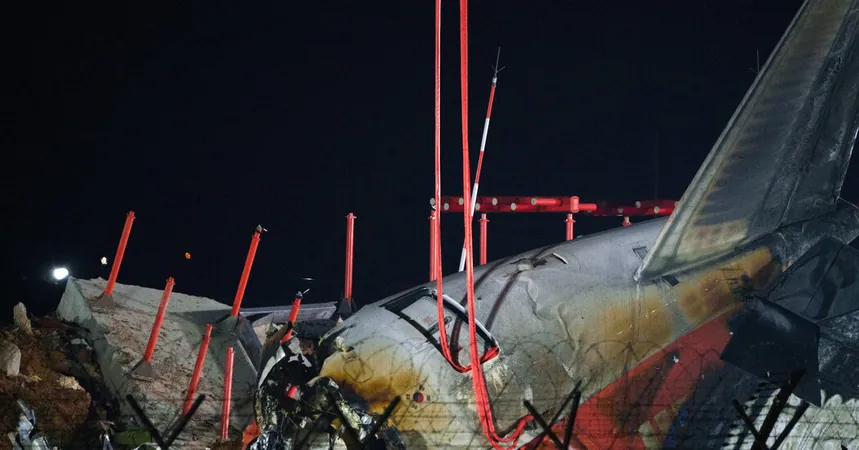
Boeing Shares Plunge Following Tragic South Korea Plane Crash: What This Means for the Aviation Giant!
2024-12-30
Author: Lok
Boeing faced a significant drop in its stock price this Monday following a catastrophic incident involving a 737-800 aircraft, a model favored by many low-cost airlines, which crashed at an airport in South Korea. The aircraft, operated by Jeju Air, was carrying 181 passengers when the disaster struck, tragically resulting in the deaths of all but two individuals.
In the wake of the crash, Boeing’s shares plummeted approximately 5% during early trading in New York, highlighting the deep concerns within the market regarding the company's safety reputation and operational stability.
The South Korean transportation ministry has announced an immediate inspection initiative for the 101 Boeing 737-800 aircraft currently in service within the country, including those operated by Jeju Air. Inspections will focus on critical components such as engines, landing gear, and maintenance records, with a completion deadline set for Friday.
Myles Walton, an analyst from Wolfe Research, pointed out that while several factors could contribute to the cause of the accident, workmanship and design issues were unlikely culprits. However, he emphasized that 'commercial aerospace’s infrequent but sometimes catastrophic accidents' pose significant risks for manufacturers like Boeing.
This incident marks yet another difficult chapter for Boeing, which has been beleaguered by labor disputes, ongoing quality control concerns, ballooning debt, and supply chain disruptions. The company has witnessed a staggering 30% decrease in its stock value over the past year alone.
Further complicating Boeing's plight, past safety concerns have resurfaced, such as an incident in January where a panel detached from a 737 Max during a flight, reigniting worries about the safety of Boeing's aircraft after the tragic Max crashes just a few years earlier. The Federal Aviation Administration (FAA) has tightened its scrutiny of the company, restricting production capabilities, which has devastated Boeing’s financial situation as it hasn't turned a yearly profit since 2018.
In a controversial admission, Boeing recently agreed to plead guilty to charges of conspiring to defraud the U.S. government in relation to the 737 Max crashes, only to have a federal judge reject the plea deal, adding another layer of complications to Boeing's ongoing legal troubles.
This year has also seen leadership changes within the company; in August, Kelly Ortberg took the helm as the new CEO after Dave Calhoun's earlier announcement of his resignation. Additionally, a lengthy strike involving 33,000 Boeing employees took place in September, severely stalling production and incurring high costs for the company.
In light of these challenges, Ortberg stated in an internal memo, 'Our business is in a difficult position, and it is hard to overstate the challenges we face together.' This was shortly before announcing a significant restructuring plan that included a workforce reduction of approximately 17,000 jobs—about 10% of Boeing's global employees.
Despite these troubling circumstances, aviation experts maintain that the 737-800 model boasts an exemplary safety record, with nearly 200 airlines utilizing the aircraft for over 25 years. With thousands still in operation and accounting for one in seven passenger planes worldwide, many are hoping this tragic event will serve as a catalyst for improved safety measures across the industry.
As Boeing navigates this storm, industry watchers and investors alike will be keenly observing the implications of this crash and the company’s broader struggles moving forward. What will this mean for the future of air travel? Only time will tell!



 Brasil (PT)
Brasil (PT)
 Canada (EN)
Canada (EN)
 Chile (ES)
Chile (ES)
 Česko (CS)
Česko (CS)
 대한민국 (KO)
대한민국 (KO)
 España (ES)
España (ES)
 France (FR)
France (FR)
 Hong Kong (EN)
Hong Kong (EN)
 Italia (IT)
Italia (IT)
 日本 (JA)
日本 (JA)
 Magyarország (HU)
Magyarország (HU)
 Norge (NO)
Norge (NO)
 Polska (PL)
Polska (PL)
 Schweiz (DE)
Schweiz (DE)
 Singapore (EN)
Singapore (EN)
 Sverige (SV)
Sverige (SV)
 Suomi (FI)
Suomi (FI)
 Türkiye (TR)
Türkiye (TR)
 الإمارات العربية المتحدة (AR)
الإمارات العربية المتحدة (AR)